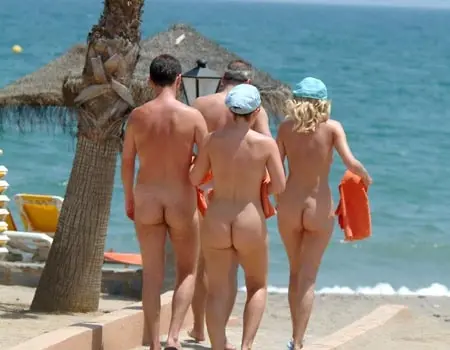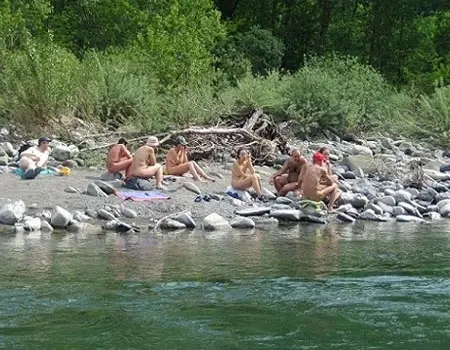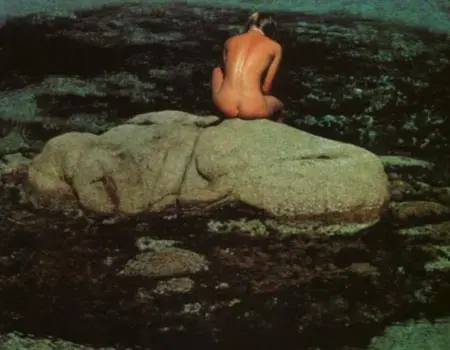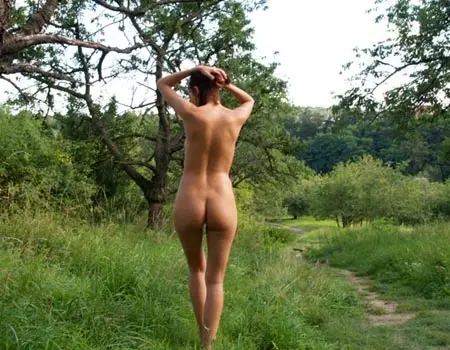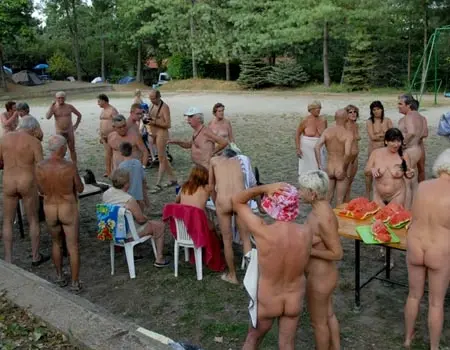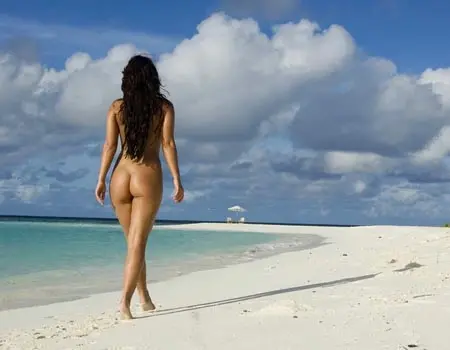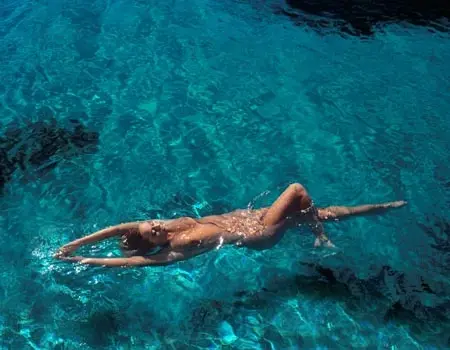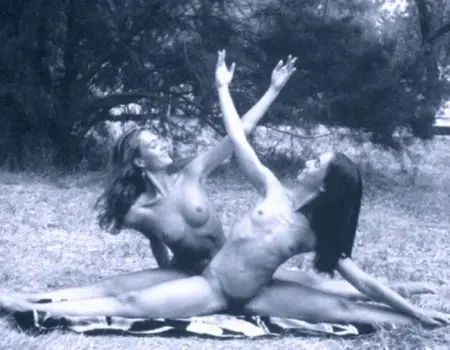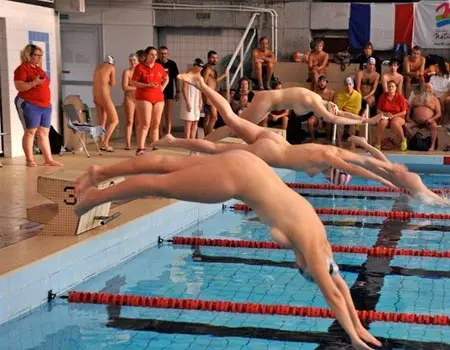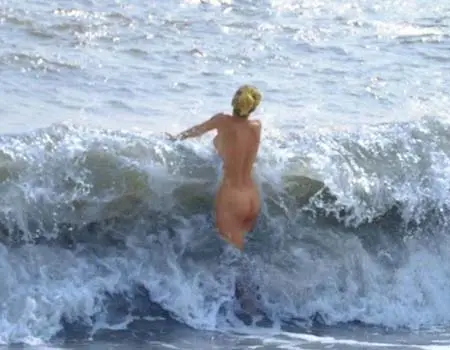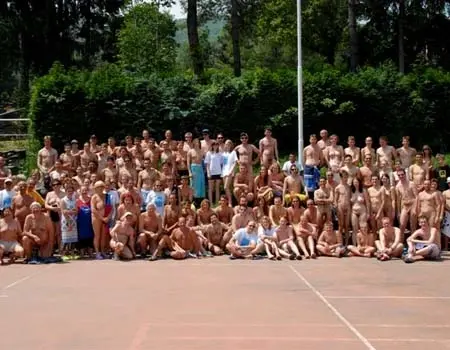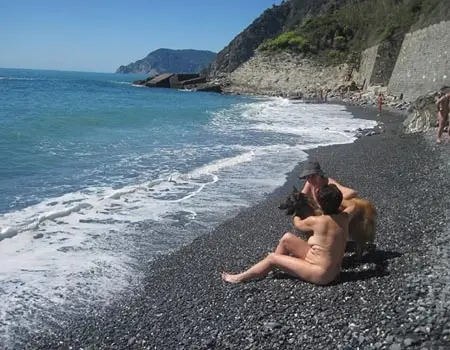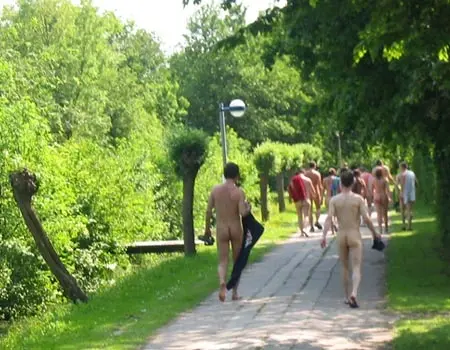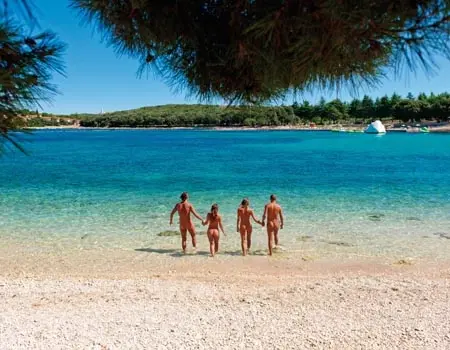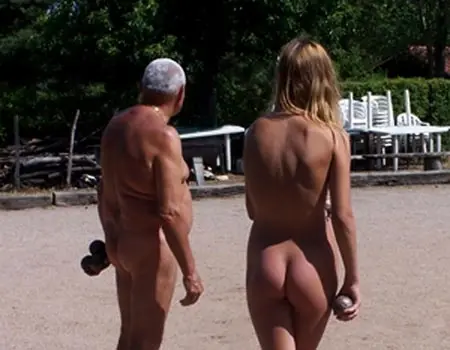Ethical naturism, commercial naturism
“ETHICAL NATURISM and COMMERCIAL NATURISM” is the title chosen for the next World Naturist Congress INF-FNI which will be held on the island of Capo Rizzuto in Calabria at the Camping Village PIZZO GRECO from 8-10 September 2010.
Below we have listed the subjects of the discussions that will be displayed at the opening of the Congress. These subjects sustain the validity of the naturist beliefs as demonstrated by the growth of our movement. In this context we could not help but mention TOM OPERTI and GIUSEPPE GHIRARDELLI, the first people who believed in naturism and in 1964 created the Italian naturist organization!
Below we have listed the subjects of the discussions that will be displayed at the opening of the Congress. These subjects sustain the validity of the naturist beliefs as demonstrated by the growth of our movement. In this context we could not help but mention TOM OPERTI and GIUSEPPE GHIRARDELLI, the first people who believed in naturism and in 1964 created the Italian naturist organization!
Dear Friends, We understand and still consider valid the definition of Naturism codified at the Agde Convention in 1974: “Naturism is a movement of principle that champions a way of living in harmony with nature, characterized by the practice of collective and heterogeneous nudity and its purpose is to respect oneself and others as well as the natural environment”.
Considering the social evolution that has occurred since then, we remind supplement this definition with more targeted content to defend the moral integrity of naturism.
For example: naturism is a healthy, natural and educational movement. Think of the perpetual discussion that has always been with us regarding the distinction between nudism and naturism. This issue returns to the surface periodically, even within the naturist world.
There are two currents of thought: on the one hand there is merely the practice of nudity and on the other the practice of ethical nudism (i.e. naturism). Let us not forget those who would like to define naturism nearly as nudism, which is not a valid definition as explained later in this article. Let's address those who say that nudism alone is not a fashion norm a banal act. Nudism is a practice that necessarily falls within the naturist orbit because naturism is its fundamental principle.
Nudity is not a banal act simply because full-bodied nudity needs the genitals uncovered, which implies the removal, conscious or unconscious, of the ancestral taboo against nudity (in fact it is no coincidence that in the past naturism was called gymnosophia –from the Greek term gymnòs= nude and sophìa= wisdom).
Therefore since the nudist experience is inseparable from the other experiences characterizing the naturist philosophy, it is self-evident - and we will no longer dwell on this point -- that nudism and naturism are identified with each other. When one practices nudity, in addition to heightening their sense of personal freedom, they recover their identity, their psychophysical health; they temper and educate their instincts toward a true respect for women, and when they cast off their clothing they also remove the mask of hypocrisy. Hence naturism becomes ethical and some people even say Utopian (but we will soon see that the latter is not true).
Now that we have defined the contours of ethical naturism, concrete reality today forces us to confront the problem of commercial naturism, and this is where we can see that it is not utopian. Yet how is this type of naturism different from what we have called "ethical" naturism? It is different because of the different vision of the way in which nudity is practiced and scariest in our time, the same problem that in the past was the cause of the early diatribes in the naturist world.
To give an example without intending polemics, the two pioneers of Italian naturism, the surly and gruff Ghirardelli and the gentle patient Operti had personalities at opposite poles of the naturist world due to their counterpoise visions of understanding and naturism: the former has free nudism that was organized, and the second is structured nudism protected within facilities/locations dedicated to naturism.
The result was that Ghirardelli, who never wanted to build naturist facilities, left us a legacy of the historical Ponte della Becca that continues to survive, in spite of 1000 difficulties, thanks to the “Gruppo Nudisti del Po”; Operti left his legacy in the form of the “Club Le Betulle” (built one piece at a time with the help of other naturists who joined him) which is a concrete example of the different vision of naturism, i.e. large-scale like in France, Croatia, etc. that today we can tranquilly define as “commercial” naturism.
Granted that everyone would like to practice the so-called “free and wild nudism” which,though free of cost, is a type of naturism that has become difficult to practice today (you have to go to secluded places that are difficult to reach and have no services), dangerous (problems of public order), unsafe (subject to raids by the police), polluted (due to behaviors that are ethically unacceptable) disturbed by textile presence, etc..
Thus said, it appears evident that the future of naturism should be "entrusted", in a manner of speaking, even though not completely "handed over", to the commercial sites that indisputably offer the advantage of safety in addition to a whole series of services that modern human beings can no longer do without and that modern naturism cannot afford to demonize. And this affirmation should always be made in the name of the concreteness and pragmatism mentioned earlier.
The wellknown definition of naturism which believes in “living according to nature” must be understood in a relative sense …merely because naturism cannot be inspired by the observance of superhuman ethical standards. Naturism must be practicable and accessible to the greatest possible number of people, and this may even involve “giving in to” the demand for the comforts that are needed to live better; and if the naturist ethic requires sacrifices from us, these must be dictated by respect and a sense of limitation (limitation against excessive eating, against the sedentary way of life, etc.).
Most important, it requires the respect for nature, and not merely as lip service, because respecting nature is the only way humanity can save its habitat, without which humans cannot live. Consequently, ethical nudism and consumerist nudism (without excess) can be joined when commercial naturism gives the opportunity to these two aspects to coexist thanks to a practicable cohabitation in the facilities of the naturist sites that are forced to simply promote nudism, i.e. comfortable nudism in caravans, campers, bungalows, hotels, cruisers, etc.
After all, the so-called commercial naturism should be “welcome” (and we use quotation marks) if it allows us to stop the exodus of young people from the naturist world, or even if it attracts them with a type of nudism that is in certain ways “consumerist” (this too we have put in quotation marks). In short, if the naturist philosophy pursues the total well-being of a person in the sphere of the so-called "living according to nature", commercial naturism can contribute to its realization because it allows ethical naturism to survive in a world where we have seen many movements disappear for failing to understand the unavoidability of the law of evolution.
After all, based on the same type of pragmatism mentioned earlier, we must acknowledge that the serious economic crisis we are currently undergoing also affects the type of naturism practiced and we have no choice but to accept "consumerist" naturism as part of its evolution.
To those who turn their nose up at this opinion, which seems to open a crack in the purity of the naturist idea, we say that it is necessary to be less dramatic about the dilemma of ethical/commercial naturism because being nude with others already means that we are naturist.
This translates to having a different behavior in relation to the current nude-phobic morality, having a different relationship with your body and the bodies of others and a different way of relating to nature (both external and internal), a different relation with your own instincts and adaptation to a different moral model (which represents a break from the climate of prevailing hypocrisy), the adaptation to a different existential model due to the introduction in our society thanks to the nudist connotation of the naturist idea, the habit of seeing people or groups of people nude, which commercial naturism also allows, though with all the limits already acknowledged and thoroughly discussed at all naturist sites.
Considering the social evolution that has occurred since then, we remind supplement this definition with more targeted content to defend the moral integrity of naturism.
For example: naturism is a healthy, natural and educational movement. Think of the perpetual discussion that has always been with us regarding the distinction between nudism and naturism. This issue returns to the surface periodically, even within the naturist world.
There are two currents of thought: on the one hand there is merely the practice of nudity and on the other the practice of ethical nudism (i.e. naturism). Let us not forget those who would like to define naturism nearly as nudism, which is not a valid definition as explained later in this article. Let's address those who say that nudism alone is not a fashion norm a banal act. Nudism is a practice that necessarily falls within the naturist orbit because naturism is its fundamental principle.
Nudity is not a banal act simply because full-bodied nudity needs the genitals uncovered, which implies the removal, conscious or unconscious, of the ancestral taboo against nudity (in fact it is no coincidence that in the past naturism was called gymnosophia –from the Greek term gymnòs= nude and sophìa= wisdom).
Therefore since the nudist experience is inseparable from the other experiences characterizing the naturist philosophy, it is self-evident - and we will no longer dwell on this point -- that nudism and naturism are identified with each other. When one practices nudity, in addition to heightening their sense of personal freedom, they recover their identity, their psychophysical health; they temper and educate their instincts toward a true respect for women, and when they cast off their clothing they also remove the mask of hypocrisy. Hence naturism becomes ethical and some people even say Utopian (but we will soon see that the latter is not true).
Now that we have defined the contours of ethical naturism, concrete reality today forces us to confront the problem of commercial naturism, and this is where we can see that it is not utopian. Yet how is this type of naturism different from what we have called "ethical" naturism? It is different because of the different vision of the way in which nudity is practiced and scariest in our time, the same problem that in the past was the cause of the early diatribes in the naturist world.
To give an example without intending polemics, the two pioneers of Italian naturism, the surly and gruff Ghirardelli and the gentle patient Operti had personalities at opposite poles of the naturist world due to their counterpoise visions of understanding and naturism: the former has free nudism that was organized, and the second is structured nudism protected within facilities/locations dedicated to naturism.
The result was that Ghirardelli, who never wanted to build naturist facilities, left us a legacy of the historical Ponte della Becca that continues to survive, in spite of 1000 difficulties, thanks to the “Gruppo Nudisti del Po”; Operti left his legacy in the form of the “Club Le Betulle” (built one piece at a time with the help of other naturists who joined him) which is a concrete example of the different vision of naturism, i.e. large-scale like in France, Croatia, etc. that today we can tranquilly define as “commercial” naturism.
Granted that everyone would like to practice the so-called “free and wild nudism” which,though free of cost, is a type of naturism that has become difficult to practice today (you have to go to secluded places that are difficult to reach and have no services), dangerous (problems of public order), unsafe (subject to raids by the police), polluted (due to behaviors that are ethically unacceptable) disturbed by textile presence, etc..
Thus said, it appears evident that the future of naturism should be "entrusted", in a manner of speaking, even though not completely "handed over", to the commercial sites that indisputably offer the advantage of safety in addition to a whole series of services that modern human beings can no longer do without and that modern naturism cannot afford to demonize. And this affirmation should always be made in the name of the concreteness and pragmatism mentioned earlier.
The wellknown definition of naturism which believes in “living according to nature” must be understood in a relative sense …merely because naturism cannot be inspired by the observance of superhuman ethical standards. Naturism must be practicable and accessible to the greatest possible number of people, and this may even involve “giving in to” the demand for the comforts that are needed to live better; and if the naturist ethic requires sacrifices from us, these must be dictated by respect and a sense of limitation (limitation against excessive eating, against the sedentary way of life, etc.).
Most important, it requires the respect for nature, and not merely as lip service, because respecting nature is the only way humanity can save its habitat, without which humans cannot live. Consequently, ethical nudism and consumerist nudism (without excess) can be joined when commercial naturism gives the opportunity to these two aspects to coexist thanks to a practicable cohabitation in the facilities of the naturist sites that are forced to simply promote nudism, i.e. comfortable nudism in caravans, campers, bungalows, hotels, cruisers, etc.
After all, the so-called commercial naturism should be “welcome” (and we use quotation marks) if it allows us to stop the exodus of young people from the naturist world, or even if it attracts them with a type of nudism that is in certain ways “consumerist” (this too we have put in quotation marks). In short, if the naturist philosophy pursues the total well-being of a person in the sphere of the so-called "living according to nature", commercial naturism can contribute to its realization because it allows ethical naturism to survive in a world where we have seen many movements disappear for failing to understand the unavoidability of the law of evolution.
After all, based on the same type of pragmatism mentioned earlier, we must acknowledge that the serious economic crisis we are currently undergoing also affects the type of naturism practiced and we have no choice but to accept "consumerist" naturism as part of its evolution.
To those who turn their nose up at this opinion, which seems to open a crack in the purity of the naturist idea, we say that it is necessary to be less dramatic about the dilemma of ethical/commercial naturism because being nude with others already means that we are naturist.
This translates to having a different behavior in relation to the current nude-phobic morality, having a different relationship with your body and the bodies of others and a different way of relating to nature (both external and internal), a different relation with your own instincts and adaptation to a different moral model (which represents a break from the climate of prevailing hypocrisy), the adaptation to a different existential model due to the introduction in our society thanks to the nudist connotation of the naturist idea, the habit of seeing people or groups of people nude, which commercial naturism also allows, though with all the limits already acknowledged and thoroughly discussed at all naturist sites.



